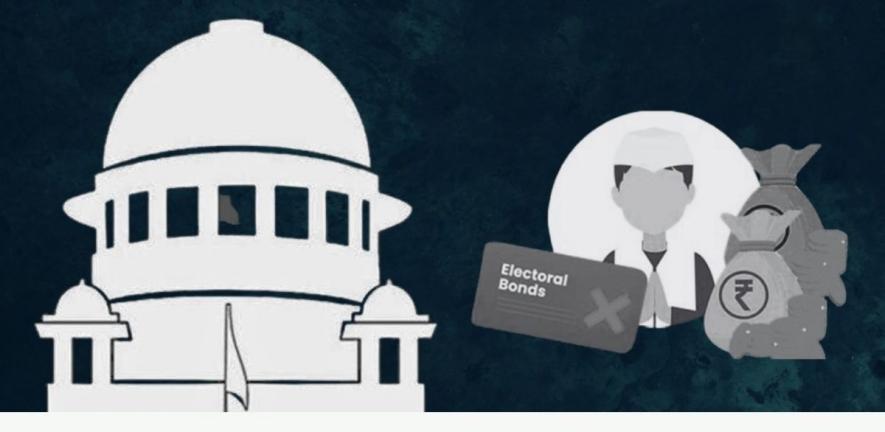On Electoral Bonds: Why is There Something Rather Than Nothing?

While some have called the electoral bonds scheme a pyrrhic victory, the author wonders what has been lost in a judgment where the rule of law and transparency have won.
—
Discerning readers would have picked up that the title of this piece derives from an age-old philosophical question.
Electoral bonds, introduced in 2017 by former Union finance minister Arun Jaitley for transparency in political funding, have been reduced to nothing, hopefully, from being something. Or many things.
Predictably, there have been reactions both for and against the Supreme Court verdict as well as the electoral bonds scheme. One expert has called the scheme “a beautiful compromise”.
Electoral bonds, introduced in 2017 by former Union finance minister Arun Jaitley for transparency in political funding, have been reduced to nothing, hopefully, from being something. Or many things.
Apart from spokespersons of the ruling Bharatiya Janata Party (BJP), who are predictably upset, some experts have called the Supreme Court verdict a “pyrrhic victory”, calling the judgment “a triumph of idealism over pragmatism”.
Some very ‘knowledgeable’ finance experts feel that the Supreme Court’s judgment is bad because parties will go back to the black money route.
But largely, in the legal as well as general communities, the judgment has been hailed as a very important one and fully in consonance with the ideals of transparency that are at the root of the democratic system.
Granted, the critics are entitled to have their discordant views as have been expressed by the knowledgeable experts. (Oxymoronic? Not really, some experts are not knowledgeable while some knowledgeable people are not regarded as experts as their views run counter to the narrative propelled by conviction, confirmation or pre-disposition biases; Bhagwad Gita says, “Eyes do not see what the mind does not want.”).
What, however, struck me in their meek or strident criticism was their reasoning for the criticism. They want to know how striking down the electoral bonds scheme will bring transparency.
The financial expert questioned: Before the electoral bonds scheme was started, did the voters know who gave money to political parties? Now they know the amount received by each part. All parties agreed to the law, all parties accepted electoral bonds.
Seems the person forgot that the opposition to the electoral bonds scheme has been going on for quite some time, in fact ever since its inception in 2017. But as the argument seemingly goes, effectively if a particular custom or usage is acceptable to all, that is kosher.
There have been many inequitable social systems that were “acceptable to all” (except perhaps to the victims thereof, but they do not matter, do they?). After all, such systems are such that “age does not wither nor custom stale”.
As regards the criticism of idealism versus pragmatism of the judgment, I was under the silly impression that the courts determine the issues based on the laws as they interpret them.
Neither idealism nor pragmatism enter into their decision matrix, except keeping in view matters such as restrictive means test of the doctrine of proportionality and finding that the electoral bonds scheme did not satisfy the same.
Some very ‘knowledgeable’ finance experts feel that the Supreme Court’s judgment is bad because parties will go back to the black money route.
I do not believe that the verdict can be labelled as a victory for anyone, as some have done, let alone a pyrrhic one.
If we believe in democracy, and that transparency is the bedrock thereof, letting go of the electoral bonds scheme achieves such transparency, so how can any victory be costly to the point of negating or outweighing expected benefits (the standard definition of pyrrhic)?
Since the amounts collected through electoral bonds are variously reported, I am collating them as best as I can. The amounts collected therein have been reported as ₹9,191 crore for all political parties, put together between 2017–18 to 2022–23 (Justice Khanna’s separate judgment Para 68).
Of these, the BJP netted a lion’s share of ₹6,566.12 crore (71.44 percent), the Indian National Congress obtained ₹1,123.32 crore (12.22 percent) and the All-India Trinamool Congress got ₹1,091 crore (11.89 percent), while the rest went to other parties.
Para 70 of the same judgment gives denomination-wise sales of electoral bonds during 27 phases (March 2018–July 2023) and gives a figure of ₹13,791.8979 crore.
It appears electoral bonds are not the only source of receiving donations. As reported in Mint, seven national parties and 24 state parties received a donation worth ₹16,437 crore between 2016–17 and 2021–22.
Of this, ₹9,191.35 crore— around 56 percent— were received through electoral bonds. So, 44 percent of donations were received from sources other than electoral bonds.
A question can be legitimately asked, in India, why should anyone at all give donations to a political party?
If they do, what is the primary objective? Why the secrecy? The secrecy issue is answered by the fear of retribution if there is a change of regime. This is mentioned in the arguments presented before the Supreme Court.
If we believe in democracy, and that transparency is the bedrock thereof, letting go of the electoral bonds scheme achieves such transparency, so how can any victory be costly to the point of negating or outweighing expected benefits (the standard definition of pyrrhic)?
Does this not reflect very poorly on the rule of law that the Constitution upholds? Is not something deeply rotten in the system of governance if even large corporate houses fear retribution if their names (as political funders) are made known?
Justice Khanna clearly mentions in Paras 38 and 39 of his judgment that “retribution, victimisation or retaliation cannot by any stretch be treated as a legitimate aim”. But then it is the reality in India, and has been so for quite a long time.
The question of secrecy is equally troubling. Evidently, a majority of the donors are the corporates (94 percent of the bonds in value terms were for one crore rupees each).
Let us further assume (charitably) that the donations are for the furtherance of the ideology of the political party. Then why all the secrecy? Is political allegiance valid only under the veil of anonymity? Obviously, something else is going on.
Para 201 of the main judgment gives us a clue. It says, “We have established the close relationship between money and politics above where we explained the importance of money for entry to politics, for winning elections and for remaining in power.
A question can be legitimately asked, in India, why should anyone at all give donations to a political party?
That being the case, the question that we ask ourselves is whether the elected would truly be responsive to the electorate if companies which bring with them huge finances and engage in quid pro quo arrangements with parties are permitted to contribute unlimited amounts.
The reason for political contributions by companies is as open as daylight. Even the learned Solicitor General did not deny during the course of the hearings that corporate donations are made to receive favours through quid pro quo arrangements.”
Like the philosophical quotation of Gottfried Wilhelm Leibniz (who gave us calculus) and who pondered as above (on the very existence of the Universe), for me much less erudite and more naïve, the moot question is “Why should there be donations by anyone at all to be given to a political party whether in power or in the Opposition?
The court said: The reason for political contributions by companies is as open as daylight. Even the learned Solicitor General did not deny during the course of the hearings that corporate donations are made to receive favours through quid pro quo arrangements.
Without a doubt, it is no use believing naïvely that political donations are made to support the ideology of that party. The obvious answer hidden in broad daylight is, “It is quid pro quo stupid, isn’t it?”
Yashwant Bhave is a 1972 batch Indian Administrative Service officer of the Maharashtra cadre.
Get the latest reports & analysis with people's perspective on Protests, movements & deep analytical videos, discussions of the current affairs in your Telegram app. Subscribe to NewsClick's Telegram channel & get Real-Time updates on stories, as they get published on our website.
























